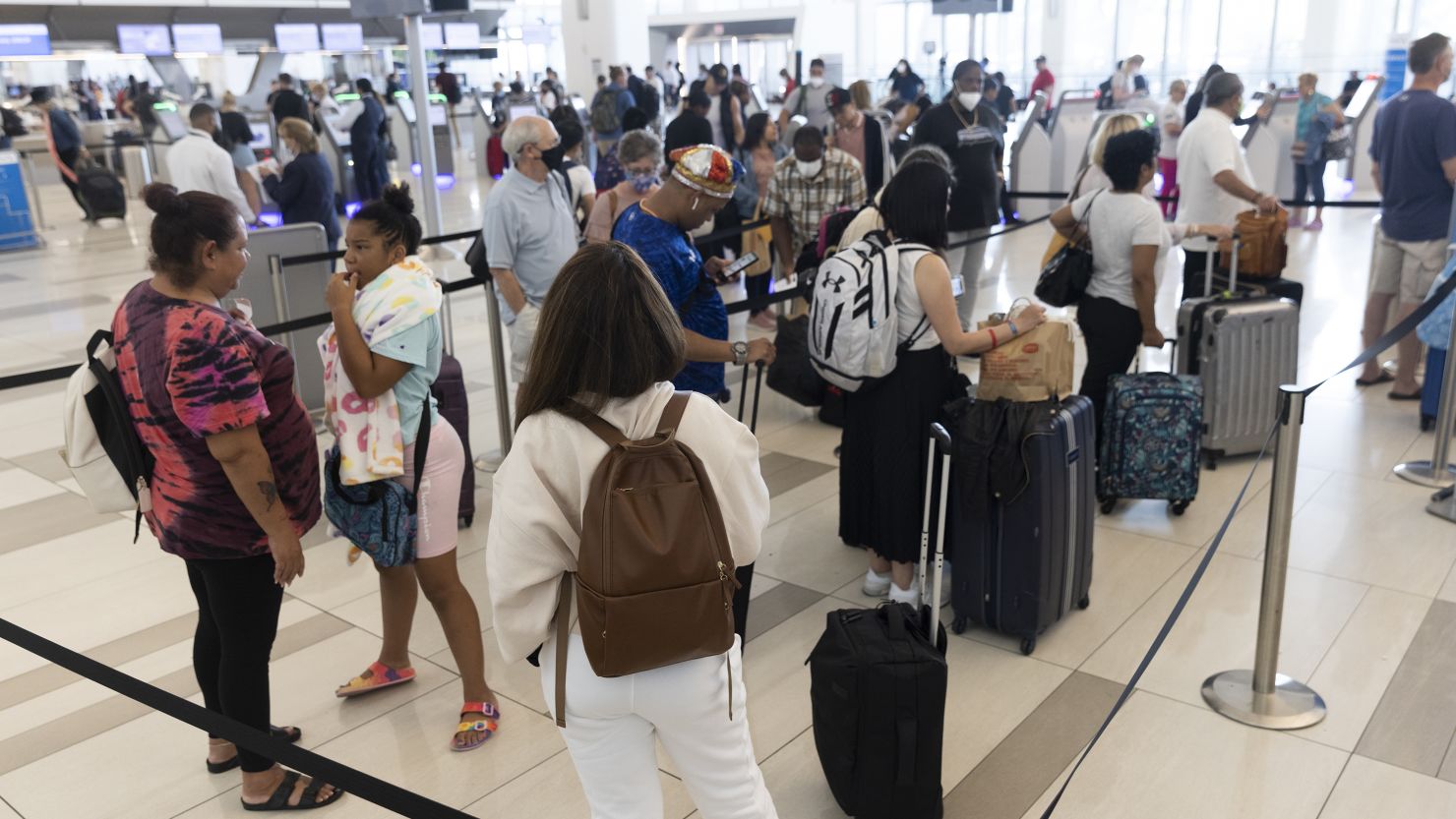Travel for the July 4 holiday weekend is revving up, and things are already getting messy.
By 4:30 p.m. ET Friday, thunderstorms in the Northeast were causing delays of an hour or more at some of the region’s major airports, according to the Federal Aviation Administration’s flight delay map.
More than 550 flights in the United States had been canceled by 8:40 p.m. ET Friday, with almost 6,500 delays, according to flight tracking site FlightAware.
This weekend could be the biggest air travel weekend for the United States in years. Delta Air Lines expects customer volumes that it has “not seen since before the pandemic” over July 4.
Delta has issued a waiver for the holiday period that allows travelers to change their tickets for free, saying “operational challenges are expected this holiday weekend.”
Weather is part of the problem.
The FAA said Friday morning that thunderstorms were possible Friday in portions of the South, Southwest, Southeast, Northeast and Midwest.
Weather could cause delays in Florida, New York and Washington, DC, the FAA said, as well as Georgia, North Carolina, Texas, Illinois, Colorado, Pennsylvania and Arizona.
So far this year, US airlines have canceled 3.5% of flights, which is up 42% over 2019, according to Department of Transportation data.
Last weekend (June 24-26), airlines canceled 2,200 flights in the United States. The weekend before, it was about 3,200, according to FlightAware.
Here are some tips for avoiding air travel cancellations and delays and what to do if your flight is disrupted.
Addressing challenges
Airline industry representatives had a call on Thursday with the FAA to plan for potential weather disruptions over the July 4 weekend.
“US airlines always strive to provide a seamless travel experience and are making every effort – including trimming schedules – to help ensure smooth travel,” Airlines for America (A4A), an industry group representing major US air carriers, said in a statement after the call with the FAA.
A4A said its members are working to hire employees in many roles – from pilots to gate agents – to address staffing shortages.
Off-duty Delta pilots picketed this week at major hubs over schedules and pay, but the protests are not expected to affect operations.
Airlines have said that some air traffic disruptions this summer are because of air traffic controller shortages.
But Secretary of Transportation Pete Buttigieg said the department is “counting on airlines to deliver for passengers and to be able to service the tickets that they sell.”
“Let’s be very clear, the majority of the delays and the majority of the cancellations have not been caused by air traffic control staffing issues,” Buttigieg told CNN’s Pete Muntean. “Bottom line here is that the airlines that are selling these tickets need to have the crews and the staff to back up those sales.”
Preemptive cancellations
Delta has already preemptively trimmed about 100 daily flights from its schedule this summer to “minimize disruptions.” United Airlines, JetBlue and Alaska Airlines have also trimmed their summer schedules in an effort to curb delays and cancellations.
Delta CEO Ed Bastian said in a note to customers this week that the airline is facing an environment “unlike anything we’ve ever faced,” and it’s taking a number of steps to provide more flexibility for customers. Bastian said Delta will even bring employees from its corporate offices into the airport to help in Atlanta and New York.
The moves come as traveler volumes rise. The number of passengers screened at US airports hit a fresh pandemic-era high on Sunday, June 26.
The Transportation Security Administration says 2,462,097 people passed through its checkpoints that day, the most since February 2020 before travel demand cratered during the pandemic. The passenger number on Thursday, June 30 – 2,444,471 – was just shy of the record.
“Staffing is still a challenge I think for everybody,” TSA Administrator David Pekoske told CNN.
“But for us, it’s not an issue that’s going to impact wait times for travelers,” he said.
More people than ever will travel by car
While many air travelers are likely to run into delays, the share of air travelers going away this holiday weekend is actually lower than it has been in a long time.
AAA said the 3.55 million people projected to take to the skies over Independence Day is only 7% of travelers. That’s the lowest share since 2011, when the economy was still rebuilding from the Great Recession.
The number of air travelers – 3.55 million – is up 1.5% from 2021 but down 9.3% from 2019 before the pandemic.
The automotive and trip-planning group’s annual forecast for the July 4 holiday weekend says that 42 million Americans – more than ever – will take a road trip of 50 miles or more.
That’s despite gas prices hitting a record earlier this month.
Top image: Travelers descend on LaGuardia Airport in New York City on July 1, 2022. (Angus Mordant/Bloomberg/Getty Images)
CNN’s Marnie Hunter contributed to this report.





